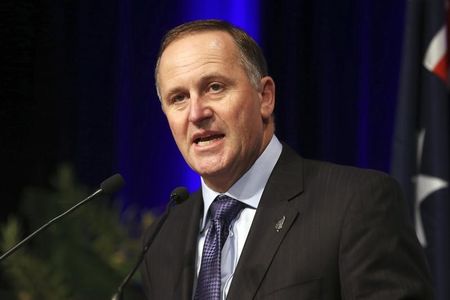WELLINGTON (Reuters) - New Zealand was preparing to conduct mass domestic surveillance last year, a U.S. investigative journalist said on Monday, five days before the country goes to the polls, provoking immediate denials from Prime Minister John Key.
The accusations by Glenn Greenwald were based on evidence disclosed by former U.S. National Security Authority contractor Edward Snowden that Key's centre-right government planned to exploit amended spying laws to sharply widen domestic spying.
Greenwald said the NSA documents showed New Zealand's electronic spy agency took the first steps towards the surveillance in a project dubbed 'Speargun', by tapping into an undersea telecoms cable into the country, while waiting for the legal authority to do so.
"Phase one entailed accessing that cable, tapping into it, and then phase two would entail metadata probes," Greenwald said on Radio New Zealand National.
Key rejected the charges as "absolutely wrong", and said a business case put up by the agency, the Government Communications Security Bureau (GCSB), early last year aimed at mass cyber protection, but was turned down by his government.
"There is not, and never has been, a cable access surveillance programme operating in New Zealand," Key said in a statement, as he released several declassified papers to back his position.
"There is not, and never has been, mass surveillance of New Zealanders undertaken by the GCSB."
Snowden's material can be accessed at: https://firstlook.org/theintercept/greenwald
New Zealand law provides that the GCSB, which conducts electronic surveillance and is part of the "Five Eyes" surveillance network along with the United States, Britain, Australia, and Canada, can only spy on New Zealand citizens if requested by a domestic law enforcement or intelligence agency.
Key said Greenwald, who was brought to New Zealand by millionaire internet entrepreneur Kim Dotcom, was being used to try to influence voters ahead of the election.
Dotcom, who is fighting extradition to the United States on charges of internet piracy, copyright breaches, and money laundering, has paid for Greenwald's trip to New Zealand.
Greenwald appeared at a public meeting of more than 1,000 people organised by a political party being bankrolled by Dotcom, at which the ebullient German had promised revelations damaging to Key.
Snowden and Wikileaks founder Julian Assange addressed the meeting through video links.
New Zealand media said the revelations involved an alleged email between a Warner Brothers film studio executive and the Motion Picture Association of America (MPAA), suggesting Key colluded with them to allow Dotcom to settle in New Zealand so that it would be easier to detain and extradite him.
Warner Brothers and the MPAA said the email was a fake, and Key said he made no such comments to the film executives.
Controversy around Dotcom's arrest and the protracted ongoing effort to extradite him, as well as charges of illegal spying, have dogged Key's government over the past two years.
In the past month links between his government and right-wing bloggers have prompted separate accusations of dirty tricks against political opponents.

But Key, largely unscathed in opinion polls, remains the favourite to gain a third consecutive term, although he is likely to need the support of minor parties to secure a majority.
(Reporting by Gyles Beckford and Naomi Tajitsu; Editing by Clarence Fernandez)
